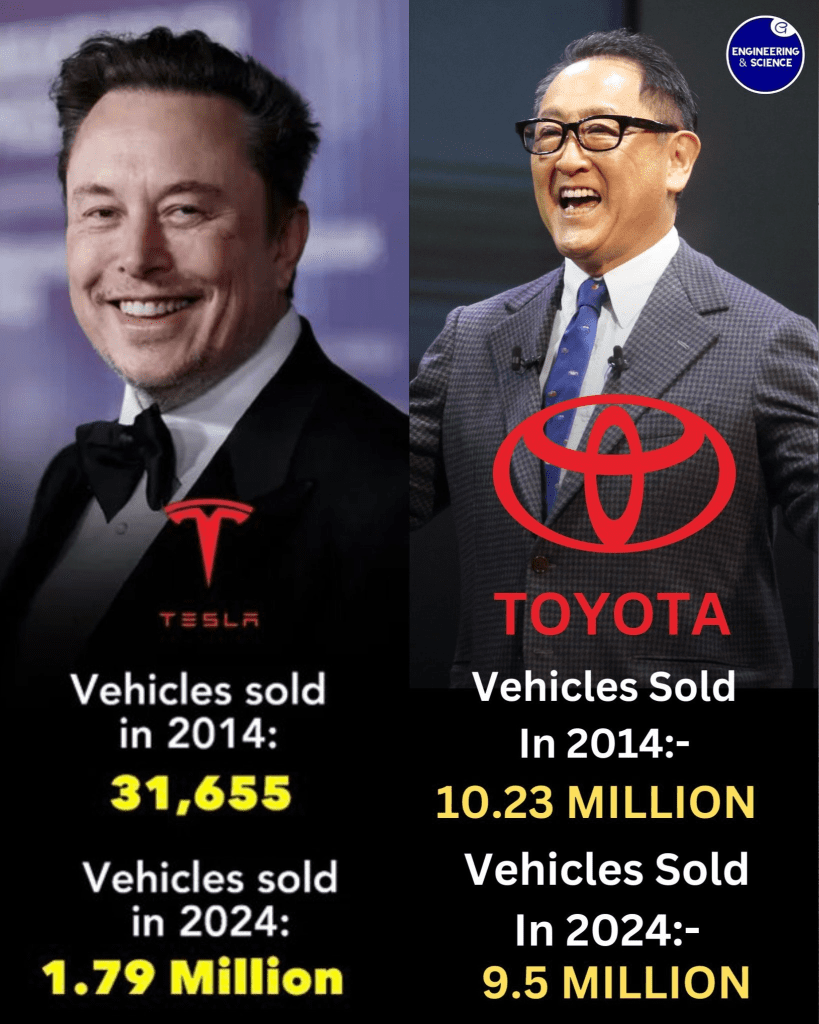
The past decade has witnessed a seismic transformation in the global automotive industry, as electric vehicle (EV) pioneer Tesla has surged to prominence, while industry stalwart Toyota has maintained its steady, albeit slightly declining, performance. This shift underscores the growing demand for electric mobility and the challenges faced by legacy automakers in adapting to a rapidly evolving market.
Tesla’s Meteoric Rise
Founded in 2003 by Elon Musk, Tesla has revolutionized the automotive sector by pushing the boundaries of electric vehicle technology, autonomous driving, and sustainable energy solutions. In 2014, Tesla was a niche player, selling just 31,655 vehicles. However, by 2024, its sales had skyrocketed to 1.79 million units, a testament to its innovative approach and increasing consumer acceptance of EVs.
Key to Tesla’s success has been its commitment to cutting-edge battery technology and a robust charging infrastructure. Models such as the Model S, Model 3, Model X, and Model Y have captured significant market share, offering superior range, performance, and over-the-air software updates that continuously improve vehicle functionality. Tesla’s advancements in autonomous driving capabilities, spearheaded by its Full Self-Driving (FSD) technology, have further solidified its position as a market leader.

Toyota’s Steady, Yet Challenged, Performance
In stark contrast, Toyota, a global automotive powerhouse since 1937, has seen a relative decline in sales amid the industry’s electrification shift. In 2014, Toyota sold an impressive 10.23 million vehicles, but by 2024, this figure had dropped to 9.5 million. Despite remaining one of the world’s top-selling automakers, Toyota has faced difficulties transitioning from its historically dominant internal combustion engine (ICE) and hybrid models to fully electric vehicles.
Toyota’s best-selling models, including the Corolla, Camry, and the pioneering Prius hybrid, have long been synonymous with fuel efficiency and reliability. However, as consumer preference shifts toward zero-emission vehicles, the company has been forced to accelerate its EV strategy. While Toyota has introduced new battery-electric models, it has lagged behind Tesla in terms of mass adoption and technological advancements in the EV space.
The Broader Implications for the Automotive Industry
Tesla’s rise and Toyota’s steady but declining trajectory exemplify a broader industry-wide transformation. Traditional automakers that dominated the market with gasoline-powered and hybrid vehicles are now racing to catch up with Tesla’s electric revolution. This transition involves significant investment in battery technology, charging networks, and software-driven automotive solutions.
As governments worldwide implement stricter emissions regulations and consumers increasingly prioritize sustainability, the pressure on legacy automakers to electrify their fleets is intensifying. Toyota’s hybrid expertise provides a solid foundation, but its slow pivot to full electrification risks ceding further market share to Tesla and other EV-first companies.

Conclusion
Tesla’s meteoric rise has reshaped the global automotive landscape, challenging century-old automakers like Toyota to rethink their strategies. While Toyota remains a formidable force in the industry, its slower transition to EVs compared to Tesla’s aggressive expansion highlights the challenges traditional carmakers face in adapting to a new era of transportation. The next decade will determine whether Toyota can successfully bridge the gap or if Tesla will further cement its dominance in the automotive world.


